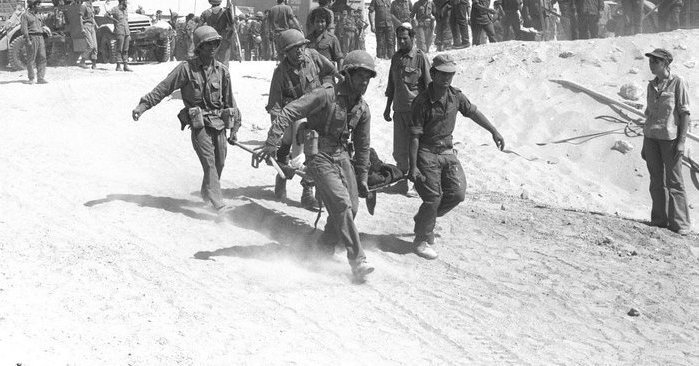Saudi Arabia has reported that it has intercepted a ballistic rocket on its southern border launched by the Houthi rebels in Yemen. The news channel Al-Arabia cited a senior Saudi military spokesperson on Friday, who stated that the rocket’s target was the Saudi city of Najran. He also said that this military act was a proof that Iran’s regime supported the Shia Houthi rebels. The rocket had been fired from a military base, reported the TV broadcaster Al-Masirah, which is controlled by the Houthis.
Saudi Arabia has previously repeatedly intercepted rockets fired from Yemen, including one close to the capital Riyadh. The United States also think that Shia Iran is behind the attacks. The Houthis control a large part of Yemen. A coalition led by Saudi Arabia has been launching air strikes against the rebels for the past three years. With these actions, the Alliance supports the internationally recognized government. The Sunni Saudi Arabia wants to curb Iran’s influence with its operations.
THE COLD WAR- A REASON FOR EUROPE’S MIGRANT CRISIS?
In reality, a Cold War has been playing out for three years between the Islamic Republic and the Kingdom. This war has several causes, for example, the prospect of gaining supremacy over the region, religious differences and economic aspects.
The fact is that this conflict affects not only the Orient but also Europe. Iran and Saudi Arabia both wage their wars in Yemen, as well as in Syria. Saudi Arabia supported the IS-Militia in Syria, which wanted to overthrow Iran’s ally, Bashar al Assad. The civil war in Syria has led to a massive flow of refugees towards Europe. Managing this migrant crisis poses a great challenge to the EU, which still hasn’t taken control of it.
Yet, the relationship between the regional powers in the period of the Persian Shahs from 1925-1979 was extremely promising. At the time, the Muslim states were considered to be allies, united by the distrust against the Arabian nationalism of Egypt’s president Gamal Abdel Nasser and the criticism of the Baath ideology by Iraq’s dictator Saddam Hussein. However, mutual cooperation decreased progressively after the fall of Reza Pahlavi.
The relations became increasingly strained after Saudi Arabia provided 25 billion dollars as assistance to Saddam Hussein during the first Gulf war from 1980 to 1988. This war cost the lives of half a million Iranians. In our times, the dispute among the Arab nations reached its peak with the execution of the Shia Sheikh Nimr al-Nimr in Riyadh.
RELIGION - A CAUSE OF THE WAR?
In the conflict between the Islamic states, religion plays a significant role. Both the Gulf states,as well as the Mullah state- Iran, want to establish themselves as serious regional powers. At the same time, they want to claim the sovereignty over the Muslims in the Middle East. The Sunni Gulf Monarchy grows apprehensive about the development of Shia Iran. After the Islamic Revolution of 1979 and the rise of Khomeini, Iran’s foreign policy is focused on strengthening the Shiites in the Middle East. The percent of the Shia population in the Arab World is very different. In Saudi Arabia it is 10%, in the United Arab Emirates it is 15% and in Kuwait it is 30%, representing only a minority. On the other hand, Shiites account for 60% of Muslims in Iraq and 70% in Bahrain. However, the Sunni king of Bahrain Hamad bin Isa Al Khalifa allegedly still suppresses the Shiites. He is accused of deliberately bringing in Sunnis from Asia in the land. During the protests in February 2011, the demonstrators demanded that the King abdicate.
Iran’s nuclear programme for civil purposes is also fomenting unrest. The Iranian nuclear plant in Bushehr is located on the Persian Gulf and an accident there would have an impact on the environment in Saudi Arabia. Just like with Chernobyl, the plant in Bushehr is built with Russian technology. In addition, the rivalry intensified as a result of the removal of sanctions on Iran. The big oil and gas resources in Iran can reduce the dependence of industrial nations on Saudi oil. Iran could also decrease the price of oil, as they want to exhaust their resources.
CAN THE EU END THIS WAR?
The Saudi Monarchy is seriously disconcerted by this state of affairs and, according to the Swedish Institute Sipri, Saudi Arabia’s arms imports from 2011 to 2015, accounted for 7% of all arms sales on the world market. It was placed second on the list, behind India. Germany, France, the United Kingdom and Spain were placed third to seventh respectively, and were the main exporters on the list.
The Syrian Civil war has claimed 300,000 lives and the bomb strikes against the Houthis in Yemen have plunged the country into a humanitarian crisis. In order to establish peace in the Middle East, the diplomatic Ice Age between Iran and Saudi Arabia has to be brought to an end. The EU could play a key role in the establishment of political dialogue, as it has diplomatic relations with both countries. Simultaneously, arms sales to the Middle East should be banned because a second migrant crisis would be fatal for the EU.


Follow the comments: |
|
